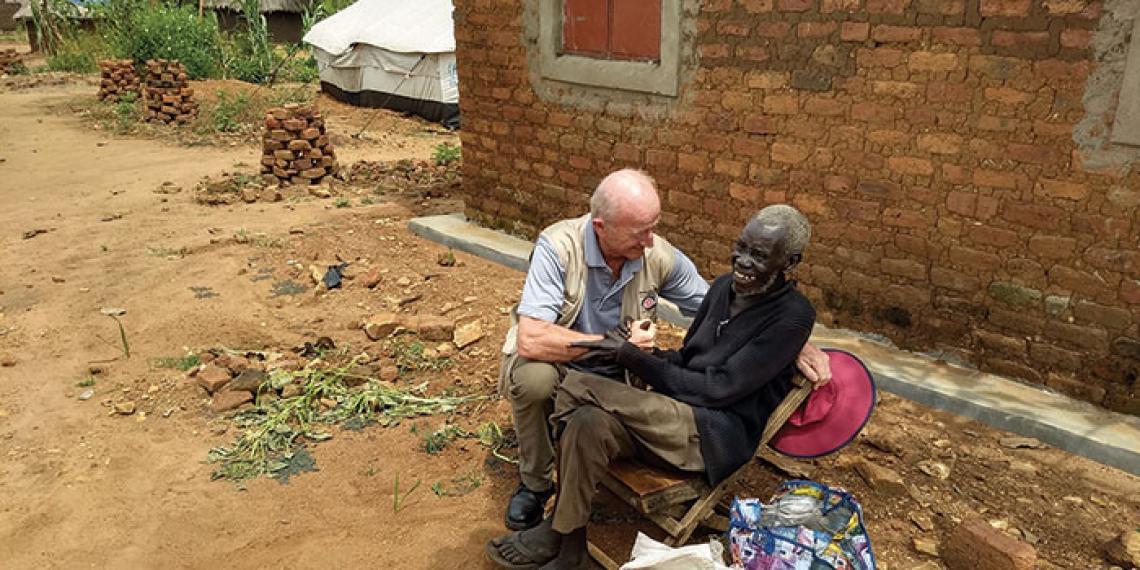You are here
Around the world in 52 years

Major David Bennett has served a record-breaking 52 years as a Salvation Army officer, and the occasion was marked with a three-month stint helping equip refugee camps in Uganda.
Late last year, David was surprised to receive special recognition for what could well be an international record, having served continuously for more than five decades as an officer. For the past eight years he has been head of Emergency Services in New Zealand, Fiji and Tonga—providing support during crises like Cyclone Winston in Fiji and the Christchurch earthquakes, as well as projects further afield, such as helping with disaster relief in Nepal.
At the long service dinner, in which David was given a special certificate of recognition, then-head of Personnel Captain Gerry Walker said that ‘52 years of continuous officership is a record in our territory, and quite possibly a world-record!’
This was soon after returning from Uganda, where he was part of an international team helping to drill wells and build latrines in two of Uganda’s refugee camps. David worked in two of the ‘smaller’ camps, each with a population of over 35,000 (Bidi Bidi, also in Uganda, is the world’s largest refugee camp with 285,000 inhabitants).
More than one million people have fled South Sudan into Uganda since violence erupted in 2013—82 per cent of them are women and children under 18. ‘All the males are being killed, and their villages burnt to the ground, forcing the women and children to flee,’ explained David.
It is difficult for the refugees to emigrate, so it is possible that children might grow up and live in the camps their entire lives. The deprivation was confronting, recalled David. ‘We were distributing non-food items, and one lady [who couldn’t walk] crawled in. People were carried in using wheelbarrows; one boy was leading his blind mother using a broom handle.’
Despite their hardships, David was struck by ‘how contented the people are with the little they have, and their real graciousness and gratitude when you were able to do anything for them.’
And there were many light-hearted moments—such as the children curiously patting David’s arms, fascinated that the white men had hair on their bodies. A fellow worker with a beard was down-right terrifying, causing the children to run away in fright—although David added that ‘this could have been because he was an Aussie!’
Many times these moments spilled into outright joy. International Emergency Services (IES) worked with local authorities and engineers to drill 18 boreholes and install water pumps. For every borehole they drilled in the camp, they also
did one for the host village. ‘When we would arrive the village elder would come to greet us and pray that we would find water,’ said David. ‘They were just over the moon when they saw the borehole flushed and pure water coming out.
Before it was even finished the villagers were coming out to use it.’ Beforehand, villagers had to walk 20–30 minutes to get water, up to six times a day.
The IES team also worked with locals to build latrines in the camps for 150 families. ‘There was no machinery, everything was done with pick and shovel,’ said David. ‘I was astounded at the level lines and finishes they got—they were as good as what we would do, with all our equipment.’
The team also distributed essential items to 1500 families, such as plates, pots, and 20-litre jerrycans for water. As with the entire project, local authorities and camp committees decided who needed the items, and where facilities were necessary.
After 52 years, David officially retired at the end of last year … well, sort of. He agreed to continue with his role in emergency services until a replacement is found, and IES has promised (threatened?) to continue calling on him ‘for as long as they can get insurance for me’.
In recalling his years of service, David was typically understated: ‘It doesn’t feel like a record-breaking stint. There have been opportunities and something needed to be done, and I was there to do it. It really hasn’t felt like a long time!’
When asked about his most adventurous appointment, David gave a surprising answer: ‘In my first year I was in Winton/Nightcaps and I went into the coal mines every month and met with the guys there. The opportunity was there, so I took it—that would have been one of my more unusual ministries.’
A highlight was working with Civil Defence on New Zealand’s national emergency plan. ‘Civil Defence trusts what The Salvation Army is able to do, and will often come to us asking us what we think,’ said David.
Looking back, what has stood out during the past decades has been how ‘God has always given me wisdom and guidance walking into situations that I was really quite fearful of. You don’t know what you’re going to say or do, but God always guides you.’
Uganda at a glance
- Uganda has 90 per cent of New Zealand’s land area, with a population of 42 million.
- There are around 1.4 million refugees or asylum seekers—over a million of these are from South Sudan.
- Over 60 per cent of refugees are children under 18.
- The Salvation Army commenced in Uganda in 1931 but was shut down by authorities in 1977. In 1980, work began with persecuted Salvationists to re-establish the mission.
- Today, there are 117 active officers in Uganda, with 96 corps and 13,566 senior solders.
by David Bennett (c) 'War Cry' magazine, 27 January 2018, pp6-9
You can read 'War Cry' at your nearest Salvation Army church or centre, or subscribe through Salvationist Resources.